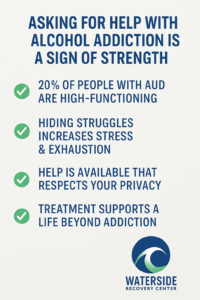You can be holding the promotion, the marriage, the clean kitchen counters—and still feel like you’re falling apart. High-functioning doesn’t mean thriving. For many of us, it just means the mask is holding… for now.
Behind closed doors, it’s a different rhythm: the first pour before the kids get home, the careful math of how much you can drink before tomorrow’s meeting, the rehearsed “just tired” excuse. You keep going because stopping feels impossible—and admitting you need help feels like detonating your entire life.
But here’s the truth you might not want to hear: asking for help isn’t the collapse you fear. It’s the first day you stop living on the edge of burnout. And in places like alcohol addiction treatment centers here in Plymouth County, MA, that moment of honesty can be the turning point you’ve been avoiding for years.
The Hidden Cost of “Functioning”
We’re told that holding it together is admirable. But for someone drinking heavily in secret, “functioning” is its own kind of cage.
You might still be getting promotions or making every school drop-off. But the mental load is punishing:
- Calculating exactly how long until you can have your next drink without being noticed.
- Managing the physical drag of hangovers with coffee, sugar, and grit.
- Overcompensating at work or home to deflect suspicion.
It’s not about “hitting rock bottom.” It’s about living with a constant drain you’ve learned to hide. Over time, that drain isn’t just emotional—it’s physical. Sleep suffers, health markers slide, and your energy becomes borrowed time.
One former client described it like this:
“It wasn’t the drinking that broke me. It was the pretending. It’s like carrying a bag of bricks every day, but you’re the only one who knows it’s there.”
Why Asking for Help Feels So Risky
If you’re high-functioning, you’ve built a life that depends on appearances—maybe even your self-worth does too. The thought of calling a treatment center brings up a cascade of fears:
- What will people think?
- Will I lose my job?
- Will they treat me like I’ve already destroyed my life?
The truth is, many treatment programs—especially in tight-knit areas like Plymouth County, MA—understand that discretion is essential. Staff are trained to protect privacy and work with professionals, parents, and anyone who can’t just “disappear” for months.
And the people who matter most? They’ll see your decision for what it is: proof that you value your life enough to protect it.

Honesty as a Turning Point
For a lot of high-functioning people, the breaking point is quiet. It’s not a DUI or a lost job—it’s a moment when you realize you’re tired of managing the secret.
One client shared:
“I sat at my kitchen table, staring at the same coffee cup I used every morning. And I just thought, ‘I can’t do another day like this.’ Calling was terrifying, but it felt like stepping onto solid ground instead of falling.”
That moment—when you say, “This isn’t working anymore”—is where everything starts to shift. You don’t have to be certain you can quit forever. You just have to be willing to stop hiding long enough to explore your options.
What Alcohol Addiction Treatment Actually Offers
If you’ve never been to treatment, you might imagine sterile hallways, group lectures, and someone taking away your phone. In reality, quality programs in Plymouth County and surrounding areas focus on building a life you want to live without alcohol—not punishing you for drinking.
You can expect:
- Confidential assessments to determine what level of care you actually need
- Flexible scheduling for outpatient or intensive outpatient programs (IOP)
- Therapists who specialize in high-functioning clients
- Peer groups where people understand the fear of being “found out”
- Skills training for managing stress, social pressure, and cravings
Treatment gives you a break from managing the lie so you can focus on something better: living without the constant pull of alcohol.
Rewriting the Definition of Strength
We often define strength as the ability to carry more than anyone thinks possible. But in recovery, strength looks different. It’s knowing when the cost is too high, and being willing to set the weight down before it crushes you.
Choosing treatment is not a public confession. It’s a private, strategic move that protects your health, your relationships, and your future. And it can be done without dismantling your life—because healing doesn’t have to mean losing everything you’ve built.
A Local Step Toward Change
If you live in Plymouth County, you have access to programs that are designed with privacy and real-life demands in mind. For those near the southern border, alcohol addiction treatment in Bristol County, MA offers the same discreet, professional support.
The first call doesn’t commit you to anything. It simply opens the door to see what help might look like for your life—not anyone else’s.
FAQ: Alcohol Addiction Treatment for High-Functioning Individuals
1. Do I have to quit my job to enter treatment?
Not necessarily. Many programs, including outpatient and IOP options, are designed so you can keep working while getting help.
2. Will anyone find out I’m in treatment?
Treatment centers are bound by strict privacy laws (HIPAA). Your participation will not be shared without your consent.
3. What if I’m not sure I’m “bad enough” for treatment?
If alcohol is taking more than it’s giving—even if you’re still meeting life’s demands—it’s worth exploring your options.
4. Can I choose the level of care that works for me?
Yes. During your initial assessment, the clinical team will recommend a plan, but you’ll have input on what’s realistic for you.
5. Is treatment only for people who’ve lost everything?
No. Many people enter treatment before a major crisis. In fact, earlier intervention often means a smoother recovery process.
Call (866)671-8620 or visit our Alcohol Addiction Treatment page to learn more about our services in Plymouth County, MA.


